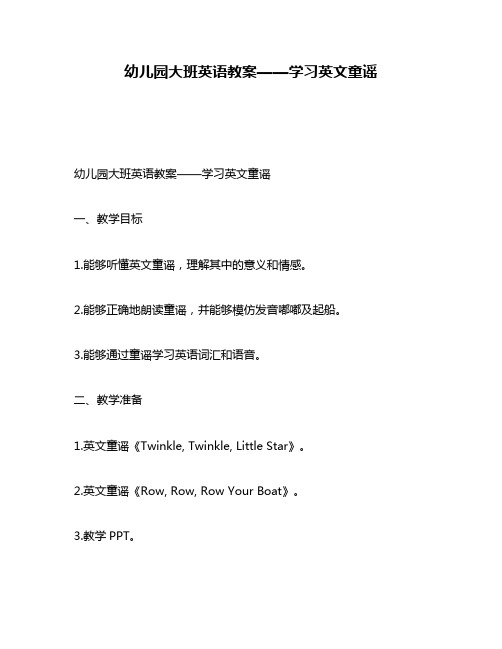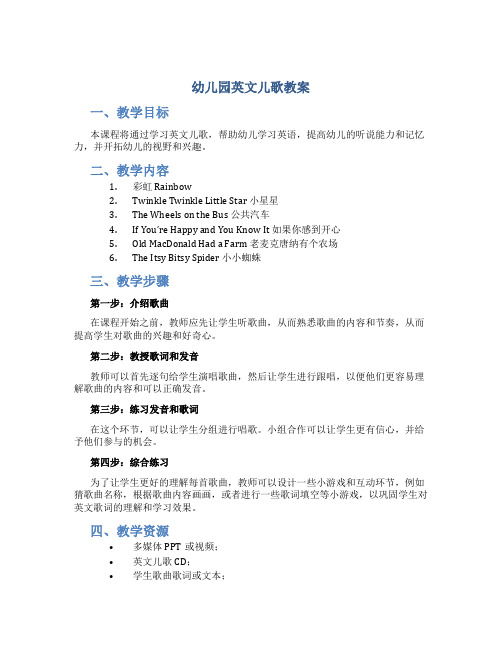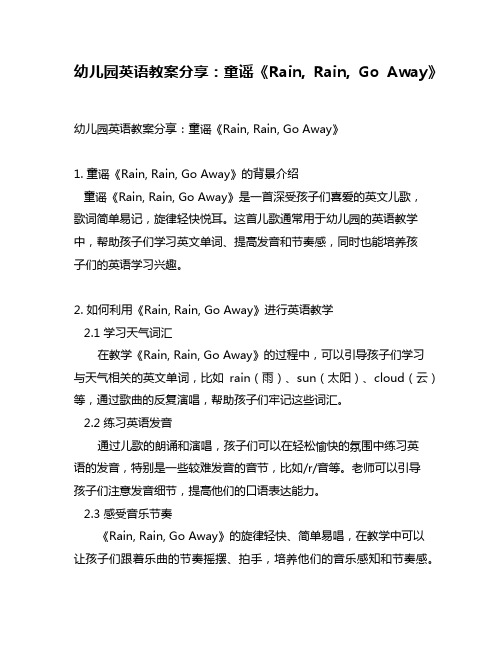幼儿园大班英语童谣教案16篇
幼儿园英文儿歌教案

幼儿园英文儿歌教案幼儿园英文儿歌教案幼儿园英文儿歌教案篇1歌曲:《Moo,moo!》活动目标:1、聆听并唱儿歌。
2、会用肢体语言表达对歌词的理解。
活动准备:教学光碟、dog、chicken、pig的单词卡片。
活动过程:一、Warm up(热身活动)1、教师与幼儿热情问好。
(Good morning)2、教师带领幼儿复习之前所学歌曲。
《Greetings》、《Fruit》二、复习单词dog、chicken、pig。
1、师;还记得上节课,我们学习的几个动物单词吗?Look at me,我手中就拿好咯,等下,老师会像魔术师一样,从我的背后,把卡片变出来给小朋友看,小朋友看到了是什么小动物,就要用好听又大声的声音说出这个动物的英文名字,明白吗?2、师:OK,我们都知道这些小动物是怎么叫的,那现在跟着老师一起用英文学出来噢!一起来说吧!Dog dog dog ,woof woof woof.Cow cow cow,moo moo moo.Pig pig pig ,oink oink oink.(即复习前一堂课的知识点,又能把本单元的新内容呈现出来。
)三、学唱歌曲1、师:今天呀,老师带来了一首关于动物的歌曲,歌曲里面还有小动物的叫声呢,可好听了,我们一起来听听吧!2、教师播放光碟,让幼儿初次聆听歌曲,对歌曲产生兴趣。
知道歌曲是快节奏的!3、师:好听吗?想不想学呀,让我们一起为小动物唱一首歌吧,这首歌曲的名字叫《moo ,moo》。
嗯,是用牛的声音来取名字的噢。
歌曲的名字叫什么呀?4、教师清唱歌曲一遍,让幼儿再次完整聆听歌曲,对歌曲的旋律有一定的熟悉程度。
5、教师唱一句,幼儿跟唱一句,可以先慢节奏的演唱歌曲,当歌曲唱到哪个小动物的时候,还可以表演出小动物的'形象动作呢!6、师、幼一起完整的演唱歌曲。
7、教师唱前半句,幼儿唱后半句。
可以交换演唱;教师唱,幼儿表演;幼儿唱,教师表演。
(动作可以夸张一点,当幼儿不熟悉的时候,教师可以带着一起演唱。
幼儿园大班英语童谣教案

幼儿园大班英语童谣教案教学目标1. 知道并能正确唱出几首英文儿歌2. 学习数数、颜色和动物名称3. 提高听力和口语表达能力4. 培养学生的音乐和英语兴趣教学重点1. 歌词的正确发音和旋律的把握2. 帮助学生理解儿歌中的数数、颜色和动物名称3. 教学过程中适当引导学生参与互动教学难点1. 学生对于英语歌曲的理解和表达能力2. 如何让学生兴趣高涨,在听到歌曲时主动举手参与互动环节教学准备1. 学生所需歌曲(如下):a. "Old Macdonald Had a Farm"b. "The Wheels on the Bus"c. "Five Little Ducks"d. "Head, Shoulders, Knees and Toes"2. 相应的课件或图片,以引导学生理解儿歌中的数数、颜色和动物名称教学步骤Step 1:引入歌曲 "Old Macdonald Had a Farm"1. 教师放歌并引导大家跟着一起唱2. 逐句讲解歌词的含义3. 请学生跟读歌词并加入到唱歌的行列中来4. 教师引导学生一起数数:How many ducks are there?(这里以"Old Macdonald Had a Farm" 做示范)学生通过数数来找到正确答案,回答 How many ducks are there?Step 2:学习 "The Wheels on the Bus"1. 教师放歌并引导大家跟着一起唱2. 逐句讲解歌词的含义3. 请学生跟读歌词并加入到唱歌的行列中来4. 引导学生利用课件或图片来理解歌曲中的颜色和形状Step 3:学习 "Five Little Ducks"1. 教师放歌并引导大家跟着一起唱2. 逐句讲解歌词的含义3. 请学生跟读歌词并加入到唱歌的行列中来4. 引导学生数数并找到正确的动物数量Step 4:学习"Head, Shoulders, Knees and Toes”1. 教师放歌并引导大家跟着一起唱2. 逐句讲解歌词的含义3. 请学生跟读歌词并加入到唱歌的行列中来4. 引导学生一起触摸身体,并通过歌曲来学习身体部位的名称Step 5:练习唱歌和参与互动1. 教师放歌让学生选择他们最喜欢的歌曲来唱2. 引导学生举手回答问题,例如:What color is the bus? 在歌曲"The Wheels on the Bus” 中3. 教师利用课件或图片来引导学生理解歌曲4. 引导学生跟着歌曲唱并参与互动Step 6:总结1. 对于学习的内容进行整合和概括2. 引导学生回顾学习内容,巩固记忆3. 教师提高学生对英语歌曲的兴趣和热情,并激励他们继续学习教学反思学生们通常对于英语童谣都有一定的好奇心和兴趣。
幼儿园英语教案--英文童谣

幼儿园英语教案--英文童谣教案主题:英文童谣教学对象:幼儿教学目标:1. 让幼儿了解英文童谣的意义和重要性;2. 通过唱英文童谣,提高幼儿听、说、读、写英语的水平;3. 通过互动活动,提高幼儿的团队合作精神和口语表达能力。
教学内容:唱英文童谣教学环节:一、引入教师出示一些英文童谣图片和相关的乐器道具,让幼儿感性认识一下这些美妙的童谣,激发他们的学习兴趣。
二、主体内容1. 教学动作:“Twinkle Twinkle Little Star”(1)教师模仿唱一遍此童谣,并带领幼儿跟着唱。
(2)教师再次唱歌时,让幼儿用手势配合,例如:向上指及摇摆双手,表示“星星在天上转悠”,或者用双手飞快地画圆圈来表现星星的运动。
(3)幼儿尝试唱歌并配合手势。
2. 教学动作:“The Wheels on the Bus”(1)教师引导幼儿快乐唱出此童谣,并鼓励他们尝试另一种语调呼喊“要上车”。
(2)教师提供一些相关的图片,例如一个公交车、一个司机、一些乘客等。
并与幼儿互动一起表演。
(3)再次唱歌和互动,让幼儿体验到生动有趣地学习英语的快感。
3. 教学动作:“Old McDonald Had a Farm”(1)教师先唱歌,再让幼儿跟着唱。
(2)教师提供一些图片,例如:一只鸡、一个牛、一只猪,以及一些相关的农场工具,并与幼儿互动玩耍。
(3)幼儿拿着相应的乐器道具,例如铃铛、摇铃等,在唱歌的过程中参与交互演出。
三、总结教师提出问题:“今天我们学到了哪些英文童谣呢?它们的旋律和歌词怎么样?”再向幼儿介绍一些学习英文童谣的好处,例如培养语感和口语表达能力,让幼儿了解到学习英文童谣的重要性。
教学流程:时间:教学环节教师活动幼儿活动引入出示图片,引导感性认识英文童谣观察图片,感受英文童谣主体内容1、“Twinkle Twinkle Little Star”模仿唱、手势配合唱歌、配合手势2、“The Wheels on the Bus”快乐唱、互动表演唱歌、参与交互演出3、“Old McDonald Had a Farm”唱歌,互动玩耍唱歌,用乐器道具参与唱歌总结提出问题,介绍学习英文童谣的好处回答问题,知道学习英文童谣的好处教学方法:多元感知法、情境模拟法、互动交流法。
幼儿园的英语儿歌教案

幼儿园的英语儿歌教案幼儿园的英语儿歌教案(精选14篇)作为一名专为他人授业解惑的人民教师,常常要写一份优秀的教案,教案是保证教学取得成功、提高教学质量的基本条件。
教案应该怎么写呢?下面是小编整理的幼儿园的英语儿歌教案,欢迎阅读,希望大家能够喜欢。
幼儿园的英语儿歌教案篇1活动目标:1、乐意参与英语游戏,体验英语游戏的乐趣。
2、学习英语单词climb、fly,能通过多种感官感知各种动作的变化,听懂英语问句“what’s it doing ?”,并尝试根据各种动作(walk, jump, run, climb, fly)来回答问句。
3、能主动大胆地与同伴、客人、老师进行交往。
活动准备:1、经验准备:(1)幼儿已学习了英语单词walk, jump, run,接触过“what’s it doing ?”的英语句型。
(2)幼儿已会唱英语歌曲《walk, jump, run》。
2.物质准备:(1)表演舞台(大纸箱外面贴上小草和鲜花)6个;各种动物纸偶若干(蝴蝶、小鸟、乌龟、兔子、马、鸭子等等);(2)纱巾一条,自制乌龟壳一个;(3)电教设备一套;制作课件:蝴蝶飞,乌龟爬;(4)录音机;音乐磁带:蝴蝶飞、乌龟爬。
教学过程:一、热身运动,复习英语歌曲《activities》,激发幼儿活动兴趣。
教师和幼儿做关于歌曲《activities》的各种动作,边唱歌边跳舞进入活动室,激发幼儿学习英语的兴趣。
t:boys and grils,let’s singing and dancing 《walk, jump, run》!(音乐起,幼儿与教师一起边唱边跳进入活动场地)二、运用多种游戏,引导幼儿学习新单词:climb 、fly,感受并练习发音。
(一 )、听辨游戏:who’s coming ?1、音乐起(轻快的音乐),蝴蝶飞入活动室。
t:oh!look!who’s coming ?c:butterfly!butterfly:i’m butterfly.i can fly!fly-fly-fly!幼儿和蝴蝶一起飞,边做动作边练习说。
幼儿园大班英文童谣教案

幼儿园大班英文童谣教案大班英语童谣教案一、教学目标1. 掌握英文童谣歌曲的歌词,熟练运用。
2. 了解英语语音、语调等基础知识,提高英语听说读写能力。
3. 培养幼儿对英语的兴趣,从小启蒙英语学习,为将来的学习打下基础。
二、教学内容1. 童谣:《Twinkle, Twinkle, Little Star》2. 童谣:《If You’re Happy and You Know It》三、教学步骤1. 童谣:《Twinkle, Twinkle, Little Star》a. 教师独唱歌曲,鼓励幼儿跟唱学习。
b. 教师讲解歌曲中的单词、语音、语调等。
c. 教师分段教唱,幼儿跟随教师学习。
d. 教师和幼儿一起唱,重点练习发音和语调。
e. 黑板上展示歌曲歌词,为幼儿了解单词和拼音提供帮助,加深记忆。
f. 进行英汉对照,帮助幼儿理解歌词含义。
2. 童谣:《If You're Happy and You Know It》a. 教师表演歌曲动作,并鼓励幼儿跟着动作学习。
b. 教师画出动作图示,帮助幼儿理解和记忆歌曲动作。
c. 教师教唱歌曲,幼儿跟随学习。
d. 教师和幼儿一起唱,并进行动作配合。
e. 黑板上展示歌曲歌词,为幼儿了解单词和拼音提供帮助,加深记忆。
f. 进行英汉对照,帮助幼儿理解歌词含义。
四、教学重点1. 歌曲发音和语调的准确掌握,抓住几个重点单词,特别是音节和重读音节。
2. 读音的感知和认知,理解歌曲歌词的意义。
五、教学方法1. 师生互动,教师演唱、教唱、示范,幼儿跟唱和动作模仿。
2. 通过视觉教学法,黑板上呈现歌曲歌词和动作图示。
3. 英汉对照,加深幼儿对歌曲的理解和记忆。
六、教学评价1. 考核幼儿是否能熟练掌握歌曲的歌词和发音,是否能够听懂歌曲含义。
2. 同时,对幼儿在跟唱、动作上的表现进行评价。
七、课后建议1. 幼儿可以继续听歌,并尝试自己唱唱看。
2. 安排一些与英语有关的活动,创造英语学习的氛围。
幼儿园英语歌曲儿歌教案

幼儿园英语歌曲儿歌教案主题:幼儿园英语歌曲儿歌教案导语:学习英语最好的方式之一就是唱英文儿歌。
儿歌旋律优美,简单易懂,是幼儿学习英语的理想方式,不仅可以让孩子轻松学习英文,还能够培养孩子的语感和音感。
本篇教案将介绍一些适合幼儿园学生的优美英文儿歌。
一、歌曲介绍1. Twinkle, Twinkle Little Star(闪闪小星星)这首歌曲是来自英国的一首民歌,曲调优美,是孩子们非常喜爱的儿童歌曲。
歌曲创作于19世纪末,是世界上最著名的儿歌之一,可以使儿童睡得香甜。
2. The Wheels on the Bus(公共汽车上的轮子)这首歌曲是一首口语化的童谣,是近代民歌的代表之一。
歌曲舒缓明快,节奏感强,富有感染力,可以使幼儿感受到公共汽车在路上的动感。
3. If You're Happy and You Know It(如果你感到快乐)这首歌曲富有互动性,是适合幼儿园学生学习的一首歌曲。
歌曲内容非常简单,易于吸收,学生们可以轻松记忆。
二、教学目标1. 让学生能够听懂这三首英文儿歌。
2. 让学生能够正确地发音、唱出这三首英文儿歌。
3. 学生们能够理解这三首英文儿歌中的基本意思。
4. 让学生们能够通过这三首英文儿歌掌握英语单词和英式语音。
三、教学内容1. 教学方法本教案强调学生的调动和互动,将以游戏、唱歌和手工制作等形式,让孩子们在轻松愉快的气氛中学习英文知识,提高语感和音感。
2. 歌曲教学(1) Twinkle, Twinkle Little Star教学前提:先播放这首歌曲的音乐,让孩子们熟悉歌曲的曲调和韵律。
步骤一:教授歌曲的歌词对于幼儿园的孩子们来说,歌词的繁琐会使他们无法理解,因此,我们可以让学生们先听老师唱完整首歌曲,然后再让孩子们跟着唱。
次数:至少唱两遍。
步骤二:学习英语单词和标准发音掌握单词和发音是学习英语的重点之一,因此,我们需要重点教授这首歌曲的部分单词和发音,让孩子们掌握这些单词以及英式语音。
幼儿园英文儿歌教学方案

幼儿园英文儿歌教学方案一、教学目标1.能够听懂、唱出10首幼儿园英文儿歌。
2.能够认读10个英文单词,如apple、banana等。
3.培养幼儿对英语的兴趣和自信心,为以后的英语学习打下基础。
二、教学内容1.《Twinkle, Twinkle, Little Star》星星闪烁。
2.《If You're Happy and You Know It》如果你开心就拍手。
3.《The Wheels on the Bus》公交车上的车轮转来转去。
4.《Old MacDonald Had a Farm》农场老麦克唐纳。
5.《Head, Shoulders, Knees and Toes》头、肩膀、膝盖和脚趾。
6.《Five Little Ducks》五只小鸭子。
7.《Row, Row, Row Your Boat》划船歌。
8.《Baa Baa Black Sheep》黑色的绵羊。
9.《Itsy Bitsy Spider》小小蜘蛛爬上来。
10.《Mary Had a Little Lamb》玛丽有一只小羊。
三、教学方法1.游戏教学法:通过带动性强的游戏,让幼儿在欢乐中轻松掌握歌曲和单词,提高记忆效果。
如:歌曲填空、音乐热线、连线游戏等。
2.视觉教学法:通过图像、图片和动画等形式辅助教学,帮助幼儿在视觉上理解和记忆歌词和单词。
如:卡通动画、PPT演示、挂图等。
3.交互教学法:让幼儿参与到教学中来,通过与教师或其他孩子的互动,使幼儿在交流中学习。
如:对话练习、角色扮演等。
四、教学过程1.导入环节:播放英文儿歌MV,让幼儿先听一遍,了解歌曲的基本旋律和情感表达。
2.学唱环节:逐句逐句地带领幼儿跟唱,在音乐的伴奏下轻松掌握歌曲。
3.认读单词环节:将每首歌的主要单词以图片的形式呈现出来,并带领幼儿认读和模仿发音。
4.游戏环节:设计多种有趣的游戏活动,培养幼儿对英语学习的兴趣和自信心。
5.评估环节:通过教师的评估和家长的反馈,及时发现幼儿学习中存在的问题,并及时进行调整和优化。
大班英语儿歌教案大全

大班英语儿歌教案大全教案1:《Twinkle, Twinkle, Little Star》(闪烁,闪烁,小星星)目标:学会唱《Twinkle, Twinkle, Little Star》,感受音乐的律动和美。
教学步骤:1. 引入歌曲:教师播放《Twinkle, Twinkle, Little Star》的音乐,并请学生跟随唱。
2.学习歌词:教师将歌曲歌词展示给学生,并逐句教学。
3.完整演唱:学生跟着音乐和教师的指挥一起演唱整首歌曲。
4.音乐鉴赏:教师带领学生聆听音乐,体验其中的美感和律动。
5.小组合唱:将学生分成若干小组,每组轮流演唱整首歌曲。
反思与延伸:通过这首欢快的儿歌,学生可以感受到音乐的魅力和律动。
可以通过拍手、跳舞等方式,让学生更好地体验音乐。
可以引导学生讨论星星的形状、颜色等,并画出自己心目中的星星。
教案2:《Old MacDonald Had a Farm》(老麦克唐纳有个农场)目标:学会唱《Old MacDonald Had a Farm》,认识农场里的动物。
教学步骤:1. 引入歌曲:教师播放《Old MacDonald Had a Farm》的音乐,让学生跟随唱。
2.学习歌词:教师将歌曲歌词展示给学生,并逐句教学。
3.完整演唱:学生跟着音乐和教师的指挥一起演唱整首歌曲。
4. 游戏:教师让学生模仿动物的叫声,例如“quack”、“moo”、“oink”,学生根据歌词唱出相应的叫声。
5.小组表演:将学生分成若干小组,每组选择一个农场里的动物进行表演,其他组员根据歌词唱出相应的动物叫声。
反思与延伸:通过这首充满趣味的儿歌,学生可以认识农场里的动物,并学习它们的叫声。
可以让学生自己编写歌词,唱出自己所知道的动物和它们的特点。
教案3:《The Wheels on the Bus》(大巴车的轮子转)目标:学会唱《The Wheels on the Bus》,认识不同部位的交通工具。
教学步骤:1. 引入歌曲:教师播放《The Wheels on the Bus》的音乐,让学生跟随唱。
幼儿园大班英语教案——学习英文童谣

幼儿园大班英语教案——学习英文童谣幼儿园大班英语教案——学习英文童谣一、教学目标1.能够听懂英文童谣,理解其中的意义和情感。
2.能够正确地朗读童谣,并能够模仿发音嘟嘟及起船。
3.能够通过童谣学习英语词汇和语音。
二、教学准备1.英文童谣《Twinkle, Twinkle, Little Star》。
2.英文童谣《Row, Row, Row Your Boat》。
3.教学PPT。
4.黑板和彩色粉笔。
5.童谣配图。
三、教学过程Step 1 Introduction (10 minutes)1.老师向学生介绍英文童谣的概念和意义。
2.老师通过展示童谣配图,让学生熟悉童谣的外形。
Step 2 Presentation (20 minutes)1.老师播放童谣《Twinkle, Twinkle, Little Star》的视频,让学生跟读童谣。
2.老师让学生在黑板上画下第一句童谣“Twinkle, Twinkle, Little Star”。
3.老师教学生发音,一句一句地朗读童谣,纠正学生发音。
4.老师通过PPT展示童谣的词汇,教学生认读这些词汇。
5.老师让学生根据童谣的意思自由创作简单的句子。
Step 3 Practice (30 minutes)1.老师播放童谣《Row, Row, Row Your Boat》的视频,让学生跟读童谣。
2.老师让学生在黑板上画下第一句童谣“Row, Row, Row Your Boat”。
3.老师教学生发音,一句一句地朗读童谣,纠正学生发音。
4.老师通过PPT展示童谣的词汇,教学生认读这些词汇。
5.老师让学生分成小组,互相对唱童谣。
6.老师让学生根据童谣的意思自由发挥,互相编排简单的对话。
Step 4 Consolidation (10 minutes)1.老师让学生用童谣的词汇造句,并在黑板上展示。
2.老师让学生分享自己的学习感悟。
Step 5 Extension (15 minutes)1.老师让学生在班级里分角色,分别唱出《Twinkle, Twinkle, Little Star》和《Row, Row, Row Your Boat》,现场表演。
大班英语童谣教案

文档仅供参照大班英语儿歌教学设计butterfly ( go up , go down,go all round)目标:1、经过看看、听听、谈谈活动,理解儿歌内容。
2、学习单词 butterfly ,词组 go up ,go down , go all round3、能踊跃参加英语活动,体验学习的快乐。
准备:课件、英文学习卡过程:一、课前热身T:Good morning boys and girls!S: Good morning Miss Su !T:How are you** ?S: I ’m fine ,thank you !二、学习儿歌A、 Look , who is coming ?Yes ,it"s a butterfly.( 出示词卡 butterfly)[ 少儿开火车练说 ]B、 Look at the picture.(1)What can you see ?Ok ,there are three butterflies go up.(出示词卡go up)(2) Now, follow me.“ butterfly,butterfly ,butterfly go up. ”(3)Who wants to try ? Boys (girls), come hereC、 Look ,(1)What can you see ?Yes ,there are three butterflies go down.(出示词卡go down)(2) Now, follow me.“ butterfly, butterfly , butterfly go down . ”( 3)Who wants to try ?(出示蝴蝶头饰 ) D、Look ,( 1)What can you see ?Yes ,there are three butterflies go all round.(出示词卡go all round)(2) Follow me.“ butterfly, butterfly , butterfly go all round. ”(3)Who wants to try ?(出示蝴蝶头饰) [个别、集体 ]E、 Let"s become this butterflies . (完好念儿歌)三、结束Are you happy ?Ok ,let"s have a rest.马虎的小画家活动目标:1、感觉歌曲中所表现的风趣、风趣的情味。
幼儿园英语童谣教案经典推荐

幼儿园英语童谣教案经典推荐作为幼儿园教育中不可或缺的一部分,英语童谣教案是帮助幼儿建立英语语感、丰富词汇、培养语言表达能力的重要教学内容。
在幼儿园英语教学中,选择经典的英语童谣教案对于孩子们的语言学习至关重要。
下面,我将为大家推荐一些经典的幼儿园英语童谣教案,并共享我的观点和理解。
一、 "Twinkle, Twinkle, Little Star"1. 教学目标:通过学唱《Twinkle, Twinkle, Little Star》,让幼儿了解星星是什么,培养幼儿对自然界的兴趣和好奇心。
2. 教学内容:通过重复学唱歌曲,教师引导幼儿观察晚上的星空,并认识星星是夜空中的光亮物体。
3. 教学活动:观看有关星空的图画和图片,让幼儿用简单的英语表达对星星的感受,激发幼儿的创造力。
4. 我的观点和理解:《Twinkle, Twinkle, Little Star》是一首经典的英语童谣,旋律简单易记,歌词富有想象力。
通过这首童谣的教学,可以让幼儿在轻松愉快的氛围中学习英语,激发幼儿的好奇心,培养他们对自然的热爱。
二、 "The Wheels on the Bus"1. 教学目标:通过学唱《The Wheels on the Bus》,让幼儿了解公共汽车,并学习公共汽车上的一些生活常识。
2. 教学内容:通过模仿公共汽车启动和行驶的声音,引导幼儿探究公共汽车的结构和功能。
3. 教学活动:让幼儿在游戏中体验公共汽车的启动、行驶、停靠等过程,培养幼儿的合作意识和团队精神。
4. 我的观点和理解:《The Wheels on the Bus》是一首生动有趣的英语童谣,通过歌词和音乐配合,可以帮助幼儿理解公共汽车的运作过程,同时激发幼儿的想象力和创造力,为幼儿提供了一个轻松愉快的学习英语的机会。
三、 "Head, Shoulders, Knees and Toes"1. 教学目标:通过学唱《Head, Shoulders, Knees and Toes》,让幼儿了解身体部位名称,并进行简单的身体活动。
幼儿园英文儿歌教案

幼儿园英文儿歌教案一、教学目标本课程将通过学习英文儿歌,帮助幼儿学习英语,提高幼儿的听说能力和记忆力,并开拓幼儿的视野和兴趣。
二、教学内容1.彩虹 Rainbow2.Twinkle Twinkle Little Star 小星星3.The Wheels on the Bus 公共汽车4.If You’re Happy and You Know It 如果你感到开心5.Old MacDonald Had a Farm 老麦克唐纳有个农场6.The Itsy Bitsy Spider 小小蜘蛛三、教学步骤第一步:介绍歌曲在课程开始之前,教师应先让学生听歌曲,从而熟悉歌曲的内容和节奏,从而提高学生对歌曲的兴趣和好奇心。
第二步:教授歌词和发音教师可以首先逐句给学生演唱歌曲,然后让学生进行跟唱,以便他们更容易理解歌曲的内容和可以正确发音。
第三步:练习发音和歌词在这个环节,可以让学生分组进行唱歌。
小组合作可以让学生更有信心,并给予他们参与的机会。
第四步:综合练习为了让学生更好的理解每首歌曲,教师可以设计一些小游戏和互动环节,例如猜歌曲名称,根据歌曲内容画画,或者进行一些歌词填空等小游戏,以巩固学生对英文歌词的理解和学习效果。
四、教学资源•多媒体PPT或视频;•英文儿歌CD;•学生歌曲歌词或文本;•小组合作文案和填空文档五、教学评估1.学生口语表现得分;2.歌曲理解度评估;3.表扬与惩罚制度。
六、教学体会学生在英文儿歌中,以听、模仿、发音为主要方式进行学习。
这是一种远离书本从视觉、听觉、口语、发音等方面的有效的学习方式。
通过这种方式,在学习中获得乐趣和自信心,乐于使用英语进行交流。
英文儿歌教学也是一种团队合作学习的过程,它鼓励学生在团队中进行学习,表达个人想法和观点所以教师应通过庆祝学生的成功,并建立积极互动的课堂氛围,以激励学生乐于使用英语进行交流。
幼儿园英语教案分享:童谣《Rain, Rain, Go Away》

幼儿园英语教案分享:童谣《Rain, Rain, Go Away》幼儿园英语教案分享:童谣《Rain, Rain, Go Away》1. 童谣《Rain, Rain, Go Away》的背景介绍童谣《Rain, Rain, Go Away》是一首深受孩子们喜爱的英文儿歌,歌词简单易记,旋律轻快悦耳。
这首儿歌通常用于幼儿园的英语教学中,帮助孩子们学习英文单词、提高发音和节奏感,同时也能培养孩子们的英语学习兴趣。
2. 如何利用《Rain, Rain, Go Away》进行英语教学2.1 学习天气词汇在教学《Rain, Rain, Go Away》的过程中,可以引导孩子们学习与天气相关的英文单词,比如rain(雨)、sun(太阳)、cloud(云)等,通过歌曲的反复演唱,帮助孩子们牢记这些词汇。
2.2 练习英语发音通过儿歌的朗诵和演唱,孩子们可以在轻松愉快的氛围中练习英语的发音,特别是一些较难发音的音节,比如/r/音等。
老师可以引导孩子们注意发音细节,提高他们的口语表达能力。
2.3 感受音乐节奏《Rain, Rain, Go Away》的旋律轻快、简单易唱,在教学中可以让孩子们跟着乐曲的节奏摇摆、拍手,培养他们的音乐感知和节奏感。
3. 我对英语教学中使用童谣的看法童谣在英语教学中起到了极大的帮助作用。
它不仅可以帮助孩子们轻松愉快地学习英文单词和句子,还能在潜移默化中培养孩子们对英文的兴趣和好感。
尤其是对于幼儿园阶段的孩子来说,利用童谣进行英语教学更能够激发他们的学习积极性。
4. 总结与回顾通过本文的详细介绍,我们了解了如何利用童谣《Rain, Rain, Go Away》进行幼儿园英语教学。
这不仅是一种有效的教学方法,更能够让孩子们在欢乐中学习,培养他们的英语语感和自信心。
希望老师们在教学中能够充分利用童谣这一教学资源,为孩子们创造更好的英语学习环境。
在今天的文章中,我们分享了针对幼儿园英语教学的童谣《Rain, Rain, Go Away》的详细教案。
大班英语童谣教案

大班英语xx教案butterfly(go up,go down,go all round)目标:1、通过看看、听听、说说活动,理解童谣内容。
2、学习单词butterfly,词组go up,go down,go all round3、能积极参与英语活动,体验学习的快乐。
准备:课件、英文学习卡过程:一、课前热身T:Good morning boys and girls!S:Good morning Miss Su!T:How are you**?S:I’m fine,thank you!二、学习xxA、Look,who is coming?Yes,it"s a butterfly.(出示词卡butterfly)[幼儿开火车练说] B、Look at the picture.(1)What can you see?Ok,there are three butterflies go up.(出示词卡go up)(2)Now,follow me.“butterfly,butterfly,butterfly go up.”(3)Who wants to try?Boys(girls),come hereC、Look,(1)What can you see?Yes,there are three butterflies go down.(出示词卡go down)(2)Now,follow me.“butterfly,butterfly,butterfly go down .”(3)Who wants to try?(出示蝴蝶头饰)D、Look,(1)What can you see?Yes,there are three butterflies go all round.(出示词卡go all round)(2)Follow me.“butterfly,butterfly,butterfly go all round .”(3)Who wants to try?(出示蝴蝶头饰)[个别、集体]E、Let"s become this butterflies .(完整念童谣)三、结束Are you happy?Ok,let"s have a rest.粗心的小画家活动目标:1、感受歌曲中所表现的幽默、滑稽的情趣。
(完整版)-【英语练习】大班英语童谣教案

大班英语童谣教案butterfly(go up,go down,go all round)目标:1、通过看看、听听、说说活动,理解童谣内容。
2、学习单词butterfly,词组go up,go down,go all round3、能积极参与英语活动,体验学习的快乐。
准备:课件、英文学习卡过程:一、课前热身T:Good morning boys and girls!S:Good morning Miss Su!T:How are you**?S:I’m fine,thank you!二、学习童谣A、Look,who is coming?Yes,it"s a butterfly.(出示词卡butterfly)[幼儿开火车练说]B、Look at the picture.(1)What can you see?Ok,there are three butterflies go up.(出示词卡go up)(2)Now,follow me.“butterfly,butterfly,butterfly go up.”(3)Who wants to try?Boys(girls),come hereC、Look,(1)What can you see?Yes,there are three butterflies go down.(出示词卡go down)(2)Now,follow me.“butterfly,butterfly,butterfly go down .”(3)Who wants to try?(出示蝴蝶头饰)D、Look,知道哥哥走的那天晚上,我一夜没睡,一直痛哭。
后来,妹妹对我说,哥哥走前的一些日子,他已经无力说话。
但是哥哥仍然吃力地对嫂子说:“你要好好活着,要好好带着儿孙过日子,你要等着做个幸福的祖奶奶的一天。
”嫂子说:“那你要好好地和我一起等!”哥哥说:“我可能等不到那一天了。
大班英语童谣教案 -省示范幼儿园大班英语教案

大班英语童谣教案 -省示范幼儿园大班英语教案大班英语童谣教案 butterfly(go up,go down,go all round)目标:1、通过看看、听听、说说活动,理解童谣内容。
2、学习单词butterfly,词组goup,godown,goallround3、能积极参与英语活动,体验学习的快乐。
准备:课件、英文学习卡过程:一、课前热身T:Goodmorningboysandgirls!S:GoodmorningMissSu!T:Howareyou**?S:I’m fine,thankyou!二、学习童谣A、Look,whoiscoming?Yes,it “sabutterfly.(出示词卡butterfly)[幼儿开火车练说]B、Look atthepicture.(1)Whatcanyousee?Ok,therearethreebutterfliesgoup.(出示词卡goup)(2)Now,followme.“butterfly,butterfly,butterfly goup.”(3)Whowantstotry?Boys(girls),comehereC、Look,(1)Whatcanyousee?Yes,therearethreebutterfliesgodown.(出示词卡godown)(2)Now,follow me.“butterfly,butterfly,butterfly godown.”(3)Whowantstotry?(出示蝴蝶头饰)D、Look,(1)What canyousee?Yes,therearethreebutterfliesgoallround.(出示词卡goallround)(2)Followme.“butterfly,butterfly,butterflygoallround.”(3)Whowantstotry?(出示蝴蝶头饰)[个别、集体]E、Let “s becomethisbutterflies.(完整念童谣)三、结束Areyouhappy?Ok,let “shavearest.。
- 1、下载文档前请自行甄别文档内容的完整性,平台不提供额外的编辑、内容补充、找答案等附加服务。
- 2、"仅部分预览"的文档,不可在线预览部分如存在完整性等问题,可反馈申请退款(可完整预览的文档不适用该条件!)。
- 3、如文档侵犯您的权益,请联系客服反馈,我们会尽快为您处理(人工客服工作时间:9:00-18:30)。
幼儿园大班英语童谣教案16篇
Title: 16 English Nursery Rhymes for Kindergarten
Theme: English Nursery Rhymes for Kindergarten
Objective:
- To enhance children’s interest in learning English through singing English nursery rhymes.
- To improve children’s pronunciation, vocabulary, and comprehension skills in English.
- To foster children’s creativity and imagination through activities related to the nursery rhymes.
Materials:
- 16 English Nursery Rhymes (downloaded from the internet or taken from a nursery rhyme book)
- CDs or online resources for playing the nursery rhyme songs - Picture cards or props related to the nursery rhymes
Activities:
1. Introduction (5 minutes)
- Greet the children and warm them up by singing a familiar English nursery rhyme.
- Ask the children if they know any new nursery rhymes in English and encourage them to share what they know.
2. Learning and Singing 16 English Nursery Rhymes (60 minutes)
- Introduce the first nursery rhyme by showing a picture card or a prop related to the rhyme.
- Play the nursery rhyme song and sing it together with the children.
- Repeat the nursery rhyme several times, encouraging the children to sing along and follow the lyrics.
- Explain the meaning and vocabulary of the nursery rhyme and ask the children to repeat after you.
- Repeat the same process for the other 15 nursery rhymes, using different props or picture cards to make the activities more engaging and interactive.
3. Activities Related to the Nursery Rhymes (30 minutes)
- Ask the children to create a drawing or a craft related to their favorite nursery rhyme.
- Encourage the children to come up with their own version of the nursery rhyme by changing some of the words or adding new characters to the story.
- Divide the children into groups and ask them to act out their favorite nursery rhyme, using props and costumes.
4. Closing (5 minutes)
- Review the 16 English nursery rhymes and ask the children to sing their favorite one.
- Thank the children for their participation and encourage them to continue learning and singing English nursery rhymes at home.
Evaluation:
- Observe the children’s participation and engagement in the activities.
- Assess the children’s pronunciation, vocabulary, and
comprehension skills by listening to their singing and responses. - Provide feedback and positive reinforcement to encourage further learning.
Conclusion:
Teaching English nursery rhymes to kindergarten children is a fun and effective way to enhance their language skills and foster their creativity and imagination. By making the activities engaging and interactive, the children can learn and enjoy the nursery rhymes while developing their communication and social skills.。
